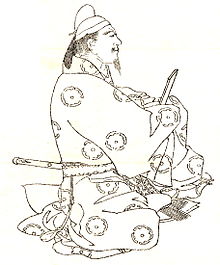Fujiwara no Umakai
Fujiwara no Umakai | |
|---|---|
 Fujiwara no Umakai drawn by Kikuchi Yōsai | |
| Born | 694 |
| Died | 7 September 737 |
| Nationality | Japanese |
| Parents | Fujiwara no Fuhito (father) |
Fujiwara no Umakai (藤原 宇合, 694 – September 7, 737) was a Japanese statesman, courtier, general and politician during the Nara period.[1] The third son of Fujiwara no Fuhito, he founded the Shikike ("Ceremonials") branch of the Fujiwara clan.
Career
He was a diplomat during the reign of
Shikibu-kyō).[3]
- 716 (Reiki 2): Along with Tajihi no Agatamori (多治比縣守), Abe no Yasumaro (阿倍安麻呂) and Ōtomo no Yamamori (大伴山守), Umakai was named to be part of a Japanese diplomatic mission to Tang China in 717-718.[2] Kibi no Makibi and the Buddhist monk Genbō were also part of the entourage.[4]
- 724 (Jinki 1, 1st month): Umakai led an army against the emishi;[5] but this military campaign was later judged to have been unsuccessful.[6]
- 729 (Tenpyō 1): The emperor invested Umakai with the power to raise an army to quash a revolt, but the cause for alarm was dissipated without the need for military action.[7]
- 737 (Tenpyō 9): Umakai died at age 44.[8] A major smallpox epidemic caused the deaths of Umakai and his three brothers.[9]
Genealogy
This member of the Fujiwara clan was son of Fujiwara no Fuhito.[1] Umakai had three brothers: Muchimaro, Fusasaki, and Maro. These four brothers are known for having established the "four houses" of the Fujiwara.[10]
Umakai's children included: Fujiwara no Hirotsugu[11] and Fujiwara no Momokawa[12]
Family
- Father: Fujiwara no Fuhito
- Mother: Soga no Shōshi (蘇我娼子, ?–?), daughter of Soga no Murajiko (蘇我連子).
- Wife: Isonokami no Kunimina no Ōtoji (石上国盛), daughter of Isonokami no Maro (石上麻呂).
- 1st son: Fujiwara no Hirotsugu (藤原広嗣, ?–740)
- 2nd son: Fujiwara no Yoshitsugu (藤原良継, 716–777)
- Wife: Takahashi no Aneko (高橋阿禰娘), daughter of Takahashi no Kasa no Ason (高橋笠朝臣).
- 3rd son: Fujiwara no Kiyonari (藤原清成, 716–777)
- Wife: unclear name (小治田功麿男牛養女)
- 5th son: Fujiwara no Tamaro (藤原田麻呂, 722–783)
- Wife: Kume no Wakame (久米若女), daughter of 久米奈保麻呂?
- 8th son: Fujiwara no Momokawa (藤原百川, 732-779)
- Wife: named (佐伯家主娘), daughter of 佐伯徳麻呂.
- 9th son: Fujiwara no Kurajimaro (藤原蔵下麻呂, 734–775)
- Children with unknown mother:
- 4th son: Fujiwara no Tsunate (藤原綱手, ?–740)
- Daughter: name unknown, wife of Fujiwara no Uona.
- Daughter: name unknown, wife of Fujiwara no Kosemaro (藤原巨勢麻呂).
- Daughter: named (掃子), possibly mother of Fujiwara no Tsunatsugu (藤原綱継).
- Wife: Isonokami no Kunimina no Ōtoji (石上国盛), daughter of Isonokami no Maro (石上麻呂).
Notes
- ^ a b Nussbaum, Louis-Frédéric. (2005). "Fujiwara no Umakai" in Japan Encyclopedia, p. 211, p. 211, at Google Books; Brinkley, Frank et al. (1915). A History of the Japanese People from the Earliest Times to the End of the Meiji Era, p. 203., p. 203, at Google Books
- ^ a b Titsingh, Isaac. (1834). Annales des empereurs du japon, p. 65, p. 65, at Google Books; see "Fousiwara-no Nokiafi", pre-Hepburn romanization
- ^ Nussbaum, "Shikibu-kyō" at p. 856, p. 856, at Google Books
- ^ Fogel, Joshua. (1996). The Literature of Travel in the Japanese Rediscovery of China, p. 22, p. 22, at Google Books; excerpt, "Like Genbō, Kibi no Makibi remained in China after the embassy ships returned to Japan, returning home himself at the same time as Genbo seventeen years later."
- ^ Brinkley, p. 223., p. 223, at Google Books
- ^ Brinkley, p. 220., p. 220, at Google Books
- ^ Titsingh,p. 68, p. 68, at Google Books
- ^ Titsingh,p. 69, p. 69, at Google Books
- ^ Brinkley, p. 190., p. 190, at Google Books
- ^ Brinkley, p. 203., p. 203, at Google Books; excerpt, "Muchimaro's home, being in the south (nan) of the capital, was called Nan-ke; Fusazaki's, being in the north (hoku), was termed Hoku-ke; Umakai's was spoken of as Shiki-ke, since he presided over the Department of Ceremonies (shiki), and Maro's went by the name of Kyō-ke, this term also having reference to his office."
- ^ Nussbaum, "Fujiwara no Hirotsugu" at p. 202, p. 202, at Google Books
- ^ Nussbaum, "Fujiwara no Momokawa" at p. 206, p. 206, at Google Books
References
- Dairoku Kikuchi. (1915). A History of the Japanese People from the Earliest Times to the End of the Meiji Era. New York: Encyclopædia Britannica. OCLC 413099
- Nihon Odai Ichiran). Paris: Royal Asiatic Society, Oriental Translation Fund of Great Britain and Ireland. OCLC 5850691
